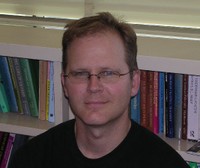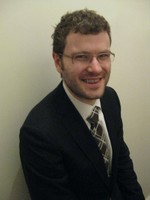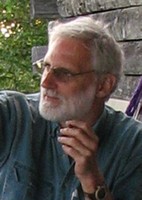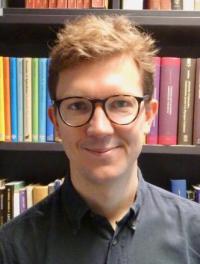Faculty Interviews

UTSC Professor Philip Kremer research interests lie in logic and philosophy of language. Learn more about him in this Q&A!
How did you get interested in philosophy?
My interest in philosophy came from two directions. First, I had persistent questions that led me to take courses related to philosophy and religion. In particular, I took a course on Thomas Aquinas, whose Summa Theologica, written around 1270, displays the structure, precision, and clarity to which philosophy should aspire. Second, my older brother — himself now a philosophy professor — suggested that I read The Foundations of Arithmetic (1884) by Gottlob Frege. This is one of the great works in the philosophy of mathematics, and is seen by many as one of the founding documents of 20th century analytic philosophy. This book converted from mathematics, which I was studying as an undergraduate, to philosophy: it begins with the foundational question, “What is a number?”, a question that has always nagged me, but is rarely pursued by professional mathematicians. Though Aquinas and Frege come from completely different worlds and have very different interests, they share a desire for clarity and precision, and are able to give powerful arguments for the most surprising results.
What are you working on right now?
Right now I’m pursuing two projects. One is on the Liar’s Paradox, and other paradoxes involving the notion of truth. The other is a project on the interface between logic and a branch of mathematics called topology.
Who is your favorite ‘historical’ philosopher?
Gottlob Frege, whose greatest works were in the late 19th century. Though he was little known during his life, he did have one great and important reader, Bertrand Russell. Through Russell, both the questions Frege asked and Frege’s style of philosophy set the tone for the 20th century and the early parts of the 21st.
Professor Benj Hellie

Benj Hellie’s research interests include philosophy of mind (consciousness, rationality, intentionality, perception, action, personal identity, interpretation, physicalism); epistemology and philosophical semantics (traditional and formal); and the history of analytical philosophy. Get to know him in this Q&A!
How did you get interested in philosophy?
From early days I have been interested in pulling back the curtain, so to speak. I became interested in logical puzzles in grade school by reading books by Martin Gardner; in junior high I would occasionally spook myself with the thought that it might be all just a dream, or that I might be a puppet controlled by aliens despite my sense of free will. In high school, I was on the debate team and the math team: the first made me think in terms of clash, structured argumentation, and the creative development of big weird ideas; the second made me think in terms of a rigorous search after truth (but definitely not vice versa!). Around that time I also (somewhat embarrassingly) developed an interest in the plutocratic propagandist Ayn Rand, who offered a really bad (and yet still accessible) history of philosophy: she made philosophers seem like crazy nuts, which of course piqued my interest. When I entered college, I knew I wanted to major in something abstract: math, philosophy, or economics. In the third quarter of my freshman year, sitting in the front row in a trailer classroom listening to Ed Zalta’s intro lecture on free will, I was instantly struck by the way philosophers had managed to impose structure on issues that, while fascinating, seemed like big nebulous blobs: at that point math and economics dropped out of the picture.
What are you working on right now?
I’m writing a book I call Conscious Life. The idea of the book is that a person’s stream of consciousness is the same thing as all the things the person does in their life. For many centuries, philosophy has been captivated by a picture on which consciousness is a sort of inert passive spectator. I think that as a result of this, a lot of issues philosophers are interested in are in a terrible muddle: in many cases, in ways that don’t even show up until you start thinking my way.
Who is your favorite ‘historical’ philosopher?
Probably Descartes. Even though he invented the sort of spectatorial view I oppose, he also invented just so much incredibly useful stuff. Human beings see things from their own point of view, but we can also ‘ascend’ from our point of view and take a ‘bird’s eye’ or even ‘God’s eye’ view (as scientists try to do). Descartes worried about the potential for clash between these points of view, asking questions like ‘who am I and how do I fit in to a more ‘objective’ world?’ and ‘what happens when what seems like truth from here could be all just a dream in the ‘objective’ world?’. These questions are still at the cutting edge in philosophy.
Of the philosophy teachers you found especially influential, what was something distinctive you learned from one of them?
I was fortunate enough to be studying in the Princeton department in the last years of the great David Lewis. Although I tear my hair out over most of Lewis’s positive views and quite a few of his philosophical preoccupations, he remains my model in many respects. The ambition and scope of his vision is without parallel in the analytic tradition; many of his papers still contain logical tools that philosophers have yet to start exploiting; the user-friendliness and beauty of his prose is a model for all of us (and one can only stand agape at its profusion: thousands of printed pages). A bit less at arm’s length, I learned from my advisor, Mark Johnston, to pursue philosophical research in an ethical spirit. I am not an ethicist in any strict sense, but in my work in the philosophy of mind I try to keep an eye on what matters. I think this keeps me moving.
What do you try to bring your undergraduate students in the classroom?
Relevance; skepticism; imagination; rigor. I want students to feel engaged; to start to peer behind the curtain; to feel that they can (after appropriate training) do this too; to learn intellectual techniques to make this all possible.
Professor Sonia Sedivy

Sonia Sedivy is Associate Professor and Chair in UTSC Philosophy. Her primary teaching and research interests lie in the philosophy of mind (particularly philosophy of perception) and in the philosophy of art and the later work of Ludwig Wittgenstein.
How did you get interested in philosophy?
I became interested in philosophy while I was an undergraduate, completing a specialist degree in Psychology along with courses in literature. In my third year I took a couple of courses that dealt with the history of psychology and that considered psychology from the perspective of philosophy of science. This helped me to understand my growing frustration and dissatisfaction. It seemed to me at the time that experimental psychology did not have the means to resolve some of the foundational issues and I was also finding that I was not especially interested in carrying out experiments myself. I had always been interested in the human mind but I couldn’t figure out how to approach trying to understand it. Neither psychology nor literature seemed right for me. I was really quite discouraged. The summer after third year I took two philosophy courses – and the fit for me, both personally and for my emerging sense of the issues, was just amazing. I found what I had been looking for. I decided to finish my specialist in psychology, since I was almost done, and the courses in fourth year were really interesting. After graduation I turned to philosophy.
What are you working on right now?
I am just finishing a book, Beauty and the End of Art, which is perhaps a philosophical love letter to both perception and beauty. I have been working on perception (as well as the nature of mental representation more generally) for quite a few years now, and it turns out that the sort of issues we need to address to understand our experiences of beauty are exactly the sorts of issues that philosophers of perception worry about (or so I argue) and that my approach to perception can help resolve. So I am working on two fronts simultaneously in this book – theory of perception and of beauty – and I can’t wait to write an article focused just on perception that would incorporate all that I have been learning from studying beauty.
Who is your favorite ‘historical’ philosopher?
This is a terribly hard question to answer! Why need one pick favourites? If I absolutely must, I would say Ludwig Wittgenstein – if he counts as ‘historical.’ If he doesn’t count, then I would probably have to say Kant.
Of the philosophy teachers you found especially influential, what was something distinctive you learned from one of them?
John McDowell, who supervised my doctoral dissertation, has been most influential. He opened up a whole different way of thinking that is hard to encapsulate in a few words. I had been studying the usual, very cognitive-science oriented approach to mind, when John McDowell arrived at my graduate school from Oxford. He introduced me to a very different, more ‘British’ way of addressing the issues, deriving from Wittgenstein, philosophy of language, right up to more contemporary philosophers that gave me a different perspective on contemporary philosophy of mind and on influential American philosophers such as Dennett and Davidson.
What do you try to bring your undergraduate students in the classroom?
I try to bring a sense that philosophy is alive today — that there are many questions that we need to address philosophically, and that it is exciting to do so. It seems to me that it is so crucial that we appreciate that not everything can be addressed through an experimental method, and that when we think about difficult or abstract questions, there can be method and constraint that we can use to guide ourselves.
Professor Jessica Wilson

UTSC Professor Jessica Wilson‘s research is primarily in general metaphysics, metaphysics of science and mind, and epistemology. Get to know her in this brief Q&A!
How did you get interested in philosophy?
In a sense I was always interested in philosophy, but it took me quite a while to figure this out. From early on I was curious about the nature and structure of reality, about how the different sciences are related, about whether the mental is fundamentally different from the physical, and so on. But it never occurred to me that one should study philosophy in order to explore such questions; I thought that philosophy was primarily the study of historical systems of (largely outdated) ideas. So as an undergraduate I studied physics and math (getting a degree in the latter); but though I enjoyed both fields of study, these turned out not to treat the questions I was interested in at a sufficient level of generality.
After getting my degree, I worked as a computer programmer for a few years, but my heart wasn’t in it, and eventually I decided to go back to school. I was living in Boulder, Colorado at the time and I got the catalog for the local branch of the University of Colorado. I was flipping through the catalog, wondering what I might study—History? English?—when I came upon the Philosophy section. Reading the course descriptions—especially concerning metaphysics and epistemology—I was completely blown away. These courses treated the questions I hoped to explore; this was the field I was hoping for! I took a couple of classes—fortuitously, the philosophy faculty at UC Boulder was (and is) excellent—and my hopes were confirmed. Here was an area of study treating the big questions—about the fundamental structure of reality, about the relations between the seemingly diverse sciences, about the nature of mind and its relation to body, about when we should take ourselves to be justified in believing something, about what it is to be a good and/or ethical person, and so on—in a rigorous and frequently illuminating fashion.
Since then, I’ve never looked back, first getting my PhD from Cornell University, then working at the University of Michigan Ann Arbor for several years before joining the philosophy faculty here at the University of Toronto Scarborough. And though I came to philosophy comparatively late, my previous studies have not gone to waste in my work in the branch of philosophy sometimes called “the metaphysics of science”. Indeed, one of the wonderful things about philosophy is that any and all relevant data—from science, math, psychology, art, literature, politics, and so on—may be brought to the table in the course of investigating a given issue or question. In this respect the study of philosophy connects up with any number of other disciplines, which is one reason why philosophy is of lifelong interest. I don’t think I’ve ever met a philosopher who was bored with their work!
What are you working on these days?
I have research interests in both the metaphysics of science and general metaphysics.
My main projects in the metaphysics of science concern how best to characterize intertheoretic relations (e.g., emergence, realization, the determinable-determinate relation) and notions (e.g., the physical) relevant to formulating certain comprehensive metaphysical theses about natural reality. So, for example, in ‘On Characterizing the Physical’ (Philosophical Studies 2009) I argue that the notion of a “physical” entity relevant to formulating physicalism (the thesis that all entities are nothing over and above physical entities) is one according to which the physical entities are those treated (approximately accurately) by current or future physics, with the proviso that the physical entities cannot be themselves fundamentally mental. I’ve also recently published papers on Newtonian forces, one of which considers and rejects arguments that forces don’t exist, and the other of which explores the relation between component and resultant forces. Most recently I’ve been working on providing a metaphysical account of nonlinear emergence in terms of the scientific notion of a degree of freedom.
My main project in general metaphysics involves assessing Hume’s Dictum, the principle (roughly speaking) that there are no metaphysically necessary connections between distinct entities. Contemporary philosophers commonly appeal to this dictum in their argumentation, but without much argument; I argue that the Dictum is not directly justified as either analytic or intuitively motivated. My latest project in this vein involves assessing whether the Dictum is indirectly justified, as required by similarity-based accounts of counterfactuals or combinatorial accounts, respectively, of what is possible for natural (broadly scientific) entities. In other projects in general metaphysics I defend the viability of singularist causation, advance an account of metaphysical modality (possibility and necessity) on which this is a relativized notion, and argue that there may be fundamental determinables. I recently finished a critical notice of the Chalmers, Manley, and Wasserman anthology, Metametaphysics, entitled ‘Much Ado about ‘Something’’.
Who is your favorite ‘historical’ philosopher?
I am a big fan of the empiricists David Hume and George Berkeley: both are excellent writers and philosophers, and though I think many of their conclusions—e.g., Hume’s claim that all causation is just a matter of correlation, and Berkeley’s claim that existence depends on (God’s) perception—can be resisted, there is no denying the many attractions of their work, and the world views they attempt to motivate and defend. Among contemporary philosophers, the late great David Lewis is perhaps the philosopher whose work I would bring to a desert island if need be: he wrote on almost every area of philosophy, more often than not leaving a seriously changed dialectical landscape in his wake.
Which teacher had the greatest influence on your philosophical research?
My most philosophically influential teacher has been Sydney Shoemaker, who supervised my dissertation (“Physicalism, Emergentism, and Fundamental Forces”) at Cornell University. My first introduction to Sydney’s work was through his article “Time and Change”—one of the first philosophy articles I read when getting started at UC Boulder. At the time I was struck by the clarity, creativity, and elegance of his argumentation (for the thesis that there could be time without change). As I soon learned, these features were characteristic of Sydney’s work, which has been very influential in a range of areas including the metaphysics of properties, causation, and modality. My own work intersects all of these areas, and is heavily informed by Sydney’s pathbreaking contributions. More generally, Sydney’s conscientious and fine-grained direction was crucial to my development as a philosopher: we would meet for hours at a time, and he would regularly give me multiple single-spaced comments on my papers. Indeed, a good friend reminds me that when I came to Cornell, I announced that I wanted to be “the next Sydney Shoemaker”. That’s a hard act to follow, but I still can’t think of a better philosopher to emulate.
What do you try to bring to your undergraduate students?
My primary aim is to provide an encouraging and rigorous environment within which students can become familiar with and engage philosophical topics at the level of sophistication appropriate to their interests and needs. Philosophical topics are of great natural interest, yet students often find philosophical debates somewhat opaque, and the practice of philosophy somewhat difficult. Hence I aim to give students the information and the dialectical tools they need to render philosophy both comprehensible and doable. So, for example, I familiarize students with both the historical foundations of and contemporary literature on the topics and debates at issue, so that they understand the underlying motivations for a given topic and experience philosophy as a historical and presently thriving work-in-progress. I also run a continuous “meta-lecture” on methodology in class, flagging as we go the philosophical moves and background assumptions at work. Making the methodology explicit greatly demystifies the practice of philosophy, allowing beginning as well as more advanced students to participate in class discussion and write structurally and argumentatively competent papers.
The dialectical and critical thinking skills that the practice of philosophy develops are of obvious value for pretty much any career; and many of our students go on to top law schools and the like. I and other members of the philosophy department also bring to our role as educators at UTSC a serious commitment to assisting those who aim to make a career in philosophy, providing feedback and advice on writing samples, graduate programs, and related issues. UTSC graduates have had considerable success in the last few years along these lines, getting full-scholarship offers for PhD programs at Princeton, Cornell, Rutgers, University of Western Ontario, and the like.
Beyond these broadly instrumental aims, I hope to bring to my students some measure of my own deep enjoyment of the world of philosophy—a pleasure that comes, in part, from knowing that you can stand on your own argumentative two feet.
Professor William Seager

UTSC Professor William Seager‘s research has been mostly in the philosophy of mind. He has published many articles in that area and two books, Metaphysics of Consciousness (1989) and Theories of Consciousness (1999). Get to know Prof. Seager in this brief Q&A!
How did you get interested in philosophy?
I stumbled into an introductory philosophy class in my first year of university and had a great time. Professor McGilp rolled his own, put his boots up on the desk and read the Republic (with comments) to the class. We then sort of “enacted” Plato’s work.
What are you working on right now?
Mostly the question of how, or if, it possible that consciousness emerges from purely physical processes. This problem is hard.
Who is your favorite ‘historical’ philosopher?
Leibniz.
Which teacher had the greatest influence on your philosophical research?
Professor Wes Cooper, a Vietnam war exile who taught philosophy of mind invited me to sit in on his graduate course. We read the then just published Content and Consciousness by Daniel Dennett and I was hooked on Philosophy of Mind forever after.
What do you try to bring to your undergraduate students?
The philosophical business of finding and criticizing arguments about inherently interesting fundamental issues should be fun. But it requires a kind of analytic vision which I try to instill in my students.
Assistant Professor Christian Pfeiffer

Christian Pfeiffer’s research interests are in ancient philosophy, in particular Aristotle. He is also interested in contemporary metaphysics.
How did you get interested in philosophy?
I became interested in philosophy during High School. I had an internship in a bookshop, and I just started reading the available books, Plato, Nietzsche, Kant, Hegel, and the French existentialists. Looking back, I have to say that I didn't understand at all what was going on, but it taught me to appreciate the intellectual challenge of reading the classics. During my first year as an undergraduate, I took a seminar on analytic philosophy and a course on logic. It was eye-opening because it taught me the values of clarity, rigor, and precision. Since then I try to combine tackling the big philosophical questions that classical authors raised with reconstructing their arguments with rigor and precision.
What are you working on right now?
Currently, I work on themes in Aristotle’s metaphysics. My main project is to write a philosophical commentary on Aristotle’s Metaphysics, Book VIII. To give some context: For Aristotle, metaphysics is concerned with what fundamentally exists, and since substance is the primary kind of being, metaphysics is, ultimately, the study of substance. In the middle books of the Metaphysics, Aristotle investigates hylomorphic substances, that is, composites of form and matter. A house is not identical to the matter it is made of, bricks and stones, but it also has a form and function, providing shelter, that makes the house what it is. Only when the matter of the house is arranged such that it provides shelter, it is a house. Although the doctrine of hylomorphism is one of Aristotle's pivotal contributions to philosophy and has seen a revival in modern-day metaphysics, it has proven difficult to spell it out precisely: What is the nature of form? Is matter itself an individual? If material substances are composites of form and matter, how can they be genuine unities? In my book, I want to reconstruct Aristotle’s answer to these questions.
Who is your favorite ‘historical’ philosopher?
Aristotle. I think he is one of the greatest geniuses of all time. Not only is his philosophy of enduring interest, but one should not forget that he was the first to use empirical methods in biology, sociology, and politics. He invented these disciplines. Also, his logic was the standard until the work of Frege and Russell. Probably no one before or after him has progressed philosophy and the sciences to such an extent.
However, if you asked me whom I would like to meet personally, it would be the Roman emperor Marcus Aurelius. He was one of the most powerful persons in the world and, at the same time, adhered to Stoic philosophy with its emphasis on virtue, humanity, and truth. It would be intriguing to have a conversation with him.
Of the philosophy teachers you found especially influential, what was something distinctive you learned from one of them?
I cannot single out one or two influences because I was fortunate in that I was always surrounded by a group of excellent scholars. But I must emphasize how much I learned from my classmates, especially my friend Stephan Schmid. When we were undergraduates, we met each Sunday to discuss philosophy. We just picked a book or topic that interested us and did research on it. Here I learned that philosophy is a collaborative enterprise.
What do you try to bring to your undergraduate students in the classroom?
Philosophy invites us to reflect on the fundamental questions concerning our life. But the real value of academic philosophy lies in the formation of skills that allow us to step beyond the initial wonder and puzzlement. It requires intellectual creativity as well as clarity and rigor in thinking and writing. This is one thing that I try to bring to my students. Another thing is an appreciation of the history of philosophy. It is a cliché to say that we are standing on the shoulder of giants. But it is true, and it is worth studying them in detail because they have shaped our conception of what philosophy is. Even when we disagree with a historical philosopher (as we often do), we may learn that our beliefs are historically shaped. This, again, invites us to ask whether we have good reasons for holding our views.